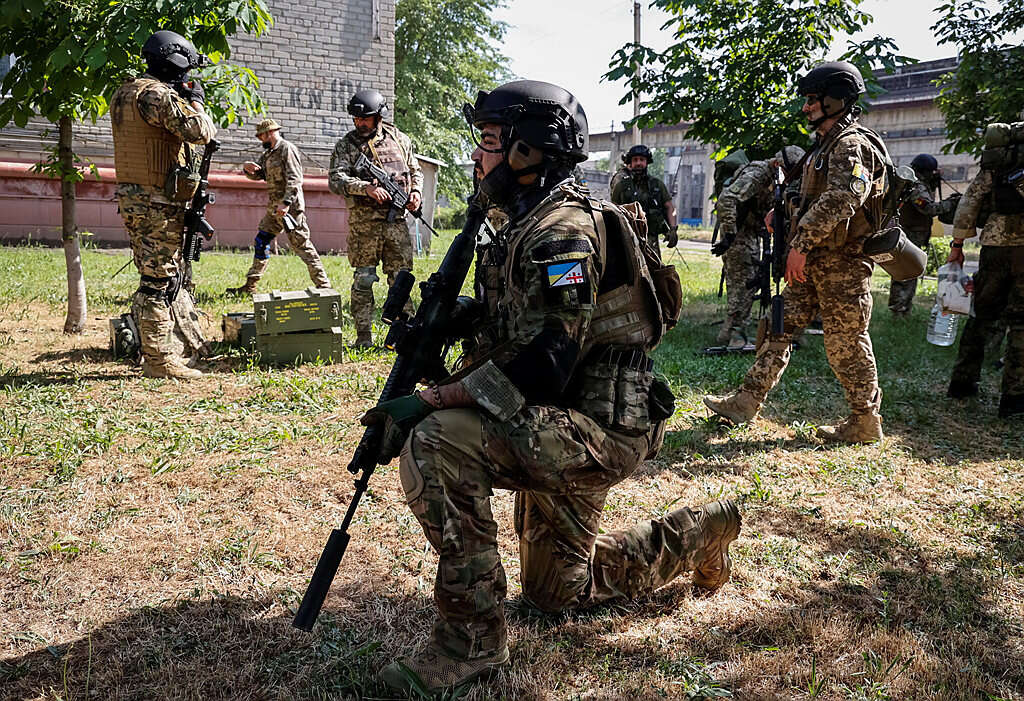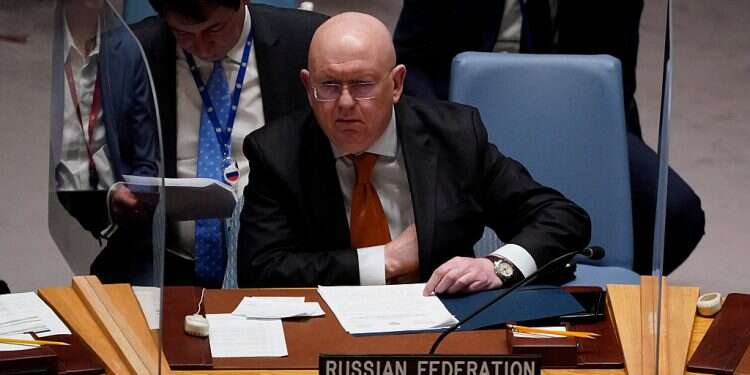Russia's UN Ambassador Vassily Nebenzia stormed out of a UN Security Council meeting on Monday as European Council President Charles Michel addressed the 15-member body and accused Moscow of fueling a global food crisis with its invasion of Ukraine.
Follow Israel Hayom on Facebook, Twitter, and Instagram
Michel had also accused Russian troops of war crimes and crimes against humanity, specifically citing reports of sexual violence – the focus of the Security Council meeting – and describing it as "a tactic of torture, terror and repression."
During his own statement earlier in the meeting, Nebenzia had "categorically refuted" any accusations of sexual violence by Russian soldiers, condemning what he said was a "lie."
As he left the Security Council chamber during Michel's statement, a visibly irritated Nebenzia said, "I couldn't stay" because of "the lies that Charles Michel came here to distribute."
Speaking directly to Nebenzia as he walked out, Michel said: "You may leave the room, maybe it's easier not to listen to the truth."

Russia's Feb. 24 invasion of Ukraine has fueled a global food crisis with prices for grains, cooking oils, fuel and fertilizer soaring. Russia and Ukraine account for nearly a third of global wheat supplies, while Russia is also a fertilizer exporter and Ukraine is an exporter of corn and sunflower oil.
"Mr. Ambassador of the Russian Federation, let's be honest, the Kremlin is using food supplies as a stealth missile against developing countries," Michel said in the Security Council. "Russia is solely responsible for this food crisis."
UN Secretary-General Antonio Guterres is trying to broker what he calls a "package deal" to resume Ukrainian food exports and Russian food and fertilizer exports. Russian Foreign Minister Sergei Lavrov is due to visit Turkey on Wednesday to discuss unlocking grain exports from Ukraine.
Meanwhile, Fighting Rages in Fierce Battle for Ukraine's East
Street fighting between Ukrainian and Russian troops raged in the battle for the industrial city of Sievierodonetsk as Moscow's forces pushed to conquer Ukraine's eastern Donbas, seeking a decisive win more than 100 days into the invasion.
Which side had the upper hand was unclear, with "the situation changing from hour to hour," Oleksandr Stryuk, head of administration in Sievierodonetsk, said on television.
The city has become the main target of the Russian offensive in the Donbas – comprising Luhansk and Donetsk provinces – as the Kremlin's invasion grinds on in a war of attrition that has seen cities laid waste by artillery barrages.
"In the city, fierce street fighting continues," President Volodymyr Zelenskyy said in his nightly video address on Monday. "The Russian army is trying to deploy additional forces towards Donbas."
The province's governor Serhiy Gaidai said earlier on Monday the situation had worsened after Ukrainian defenders had pushed back the Russians over the weekend as they seemed close to victory.
Alon on Monday, Russia warned US news organizations that they risked being stripped of their accreditation unless the treatment of Russian journalists in the United States improves, according to three sources with knowledge of the matter.
Since Russia invaded Ukraine, some Russian state media have been prevented from operating in the United States and some other Western states by withdrawing their broadcasting licenses and sanctioning the outlets, steps Moscow says show a disregard for media freedom.
In Moscow, President Vladimir Putin signed a law in March imposing a jail term of up to 15 years for spreading intentionally "fake" news about the military, prompting some Western media to pull their journalists out of Russia.
Maria Zakharova, Russia's Foreign Ministry spokeswoman, announced last week she was calling in the heads of US media outlets to notify them of "the most stringent measures" in response to the "hostility" encountered by their Russian peers in the United States.
Zakharova warned the outlets that if Russian journalists were not able to work freely in the United States, then their reporters in Russia risked facing similar difficulties with their visas, media accreditation and bank accounts.
Later, the Kremlin placed Investigative journalist Andrei Soldatov, known for his coverage of Russian security agencies, on a wanted list and frozen his bank accounts.
The Interior Ministry's website listed Soldatov, who could not be reached by phone, as wanted under an unspecified article of the criminal code.
In a separate post in the Telegram messaging platform, Soldatov wrote that the case against him had been filed in a manner similar to that of two journalists accused of spreading "fake information" about Moscow's military campaign in Ukraine.
"We are clarifying the details," Soldatov wrote.
Soldatov, who co-founded the Agentura.ru website, wrote on Twitter: "My Monday: my accounts in Russian banks are under arrest, plus I'm placed on Russia's wanted list."
Subscribe to Israel Hayom's daily newsletter and never miss our top stories!




